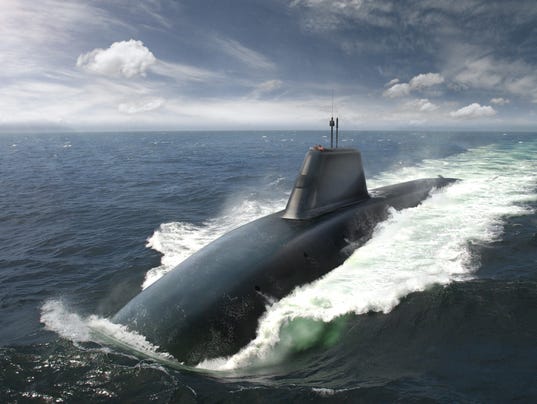
Computer-generated image of a proposed replacement for the British Vanguard-class submarine.
By Andrew Chuter/Defense News
12 March 2015
LONDON — Britain's Defence Ministry has increased spending on the assessment phase for a new generation of Royal Navy nuclear missile submarines.
The £285 million (US $429 million) deal primarily involves BAE Systems, but nuclear power plant builder Rolls-Royce and support provider Babcock also have small contracts.
The deal covers the final phase of design work on the successor submarines to the four Vanguard-class Trident missile boats currently providing Britain's nuclear deterrent. The subs are planned to begin entering service in 2028.
A decision is due next year by the new government on whether to go ahead and build the new missile boats.
"The successor program is the largest and most complex project we have ever faced. This funding will now allow us to mature the design over the next 12 months to enable us to start construction in 2016," said Tony Johns, the managing director at BAE Systems' Submarines.
More than £2 billion had been spent on the submarine's concept and assessment phase work by the end of the financial year 2013/2014 and that total continues to grow as part of a planned £3.3 billion spend ahead of approval for construction.
Replacing the nuclear deterrent is the single largest procurement program of the next decade or so.
Royal United Services Institute analyst Malcolm Chalmers wrote in a report released March 9 on the UK's defense budgetary problems that when spending on nuclear submarines and related deterrent projects is at its peak between 2024 and the end of the decade, it will consume about 37 percent of the total projected procurement budget.
Some defense contract announcements have already been rolled out by the Conservative-led coalition in the last few weeks and more may follow, possibly as part of the budget statement from Chancellor George Osborne next week.
Defense program uncertainty is likely to last considerably longer than the end of the purdah period, however. A cross-government spending review is planned for October and a strategic defense and security review likely to run into 2016 is set to provide uncertainty for months.
Potentially deep defense cuts and questions over the British government's failure to commit to retaining defense spending at the 2 percent level mandated by NATO have sparked a war of words. That war has stretched as far as Washington, with President Barack Obama and others voicing concern over possible defense spending cuts in Britain.
Defence Secretary Michael Fallon was in Washington Wednesday defending Britain's spending record on the military in a speech to a US think tank.
The British defense secretary failed to give any commitment to continuing to meet NATO's mandated military spending target of 2 percent of gross domestic product (GDP) and instead sought to move the debate to the poor budget record of other European countries.
"You want to see an end to the decline in Europe's defense spending that has a quarter of the alliance spending less than 1 percent of GDP on defense and 20 of the 28 members spending less than 1.5 percent. So do we," he said.
On Tuesday, Samantha Power, the US ambassador to the United Nations, criticized European defense spending in a speech in Brussels saying she was "very concerned."
The Financial Times reported on Wednesday that the government is looking for ways to "pad out" spending to meet the NATO commitment.
The government is already for the first time adding £820 million in war pensions to its NATO-declared defense spending. The newspaper said Prime Minister David Cameron has asked officials to look at whether the intelligence budget could also be included.
A motion is scheduled to be debated in the House of Commons Thursday that would make it a legal obligation for the UK government to maintain spending at the NATO 2 percent level.
Similar legislation is working its way through Parliament requiring overseas aid to be legally maintained at 0.7 percent of GDP.


No comments:
Post a Comment